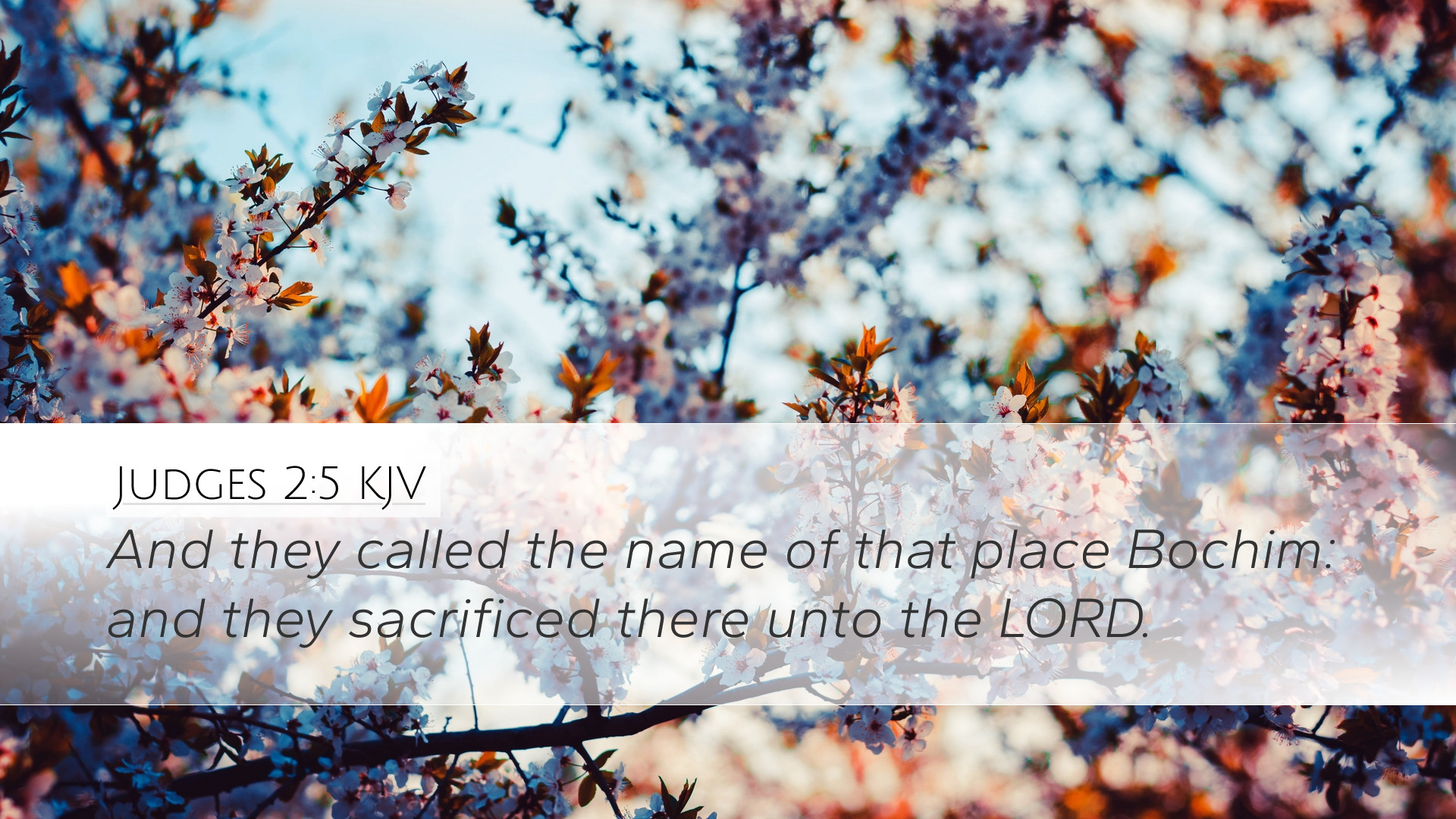Old Testament
Genesis Exodus Leviticus Numbers Deuteronomy Joshua Judges Ruth 1 Samuel 2 Samuel 1 Kings 2 Kings 1 Chronicles 2 Chronicles Ezra Nehemiah Esther Job Psalms Proverbs Ecclesiastes Song of Solomon Isaiah Jeremiah Lamentations Ezekiel Daniel Hosea Joel Amos Obadiah Jonah Micah Nahum Habakkuk Zephaniah Haggai Zechariah MalachiJudges 2:5
Judges 2:5 KJV
And they called the name of that place Bochim: and they sacrificed there unto the LORD.
Judges 2:5 Bible Commentary
Commentary on Judges 2:5
Verse: "And they called the name of that place Bochim: and they sacrificed there unto the Lord." (Judges 2:5)
The verse presents a pivotal moment in the history of Israel as they reflect on their covenant with God after the arrival in the land of Canaan. The name 'Bochim' means 'weeping,' which signifies a deep sense of repentance and sorrow among the Israelites.
Contextual Analysis
This verse occurs in a transitional section of the Book of Judges following the death of Joshua. It marks a significant turning point as the Israelites turn back to the Lord, which serves as an introduction to the cycles of sin, punishment, repentance, and deliverance that characterize the book.
Insights from Matthew Henry
Matthew Henry emphasizes the emotive response of the Israelites at Bochim, pointing out that their tears were a sign of genuine remorse for their failure to fully obey God's commands. He notes:
- Repentance: The tears signify an acknowledgment of sin and a recognition of their covenant obligations.
- Place of Sacrifice: The sacrificial offerings at Bochim demonstrate their desire to restore their relationship with God.
- Vow Renewal: This act was also a symbol of recommitting themselves to God's commands.
Insights from Albert Barnes
Albert Barnes highlights the implications of the name 'Bochim' and the actions of the Israelites:
- The Importance of Names: The name 'Bochim' reflects the nature of their condition, encapsulating their emotional state during this encounter with God.
- Historical Reminder: By naming the place 'Weeping,' it not only serves as a memorial for future generations but also provides a sobering reminder of the consequences of disobedience to God.
- Divine Compassion: Barnes reflects on God's readiness to forgive, emphasizing that they were met with divine compassion and mercy upon their return to Him.
Insights from Adam Clarke
Adam Clarke provides a deeper exegesis concerning the significance of their sacrifices:
- Nature of Worship: Clarke underscores that the act of sacrificing at Bochim was a heartfelt return to worship in spirit and truth, essential for a vibrant faith.
- Collective Mourning: He also points out the communal aspect of mourning, which illustrates how their corporate sin prompted a shared response.
- Commitment to God: Clarke notes that the Israelites' resolution to offer sacrifices indicates a renewed commitment to their covenant relationship with God, showcasing a longing for re-establishment of divine favor.
Thematic Reflections
This passage is pregnant with themes pertinent to contemporary readers:
- Call to Remembrance: There is a need for believers to remember their past failures and God's faithfulness in mercy.
- Importance of Repentance: A call for genuine sorrow over sin and a return to the Lord through acts of worship.
- Community Response: The collective aspect of worship and repentance can foster communal health within the body of Christ.
- Divine Mercy: Highlighting God’s willingness to receive those who turn back to Him in sincerity.
Practical Applications
Pastors, students, and scholars can draw several practical lessons from Judges 2:5:
- Encourage Authenticity: Teach the importance of emotional honesty before God in both personal and corporate worship settings.
- Foster Repentance: Create opportunities for believers to repent and seek renewal in their relationship with God.
- Highlight Sacrificial Worship: Remind congregations that true worship involves self-sacrifice and a commitment to obey God's Word.
- Community Engagement: Address ways the church can collectively acknowledge its failings and demonstrate a unified response to God's call to repentance.
Conclusion
Judges 2:5 serves as an impactful reminder of the cyclical nature of faith, sin, and redemption. The Israelites' experience at Bochim encapsulates the vital themes of repentance, communal accountability, and the unwavering mercy of God. Such reflections invite pastors, theologians, students, and scholars alike to engage deeply with the text, uncovering its layers of meaning and applying its truths to the church today.


